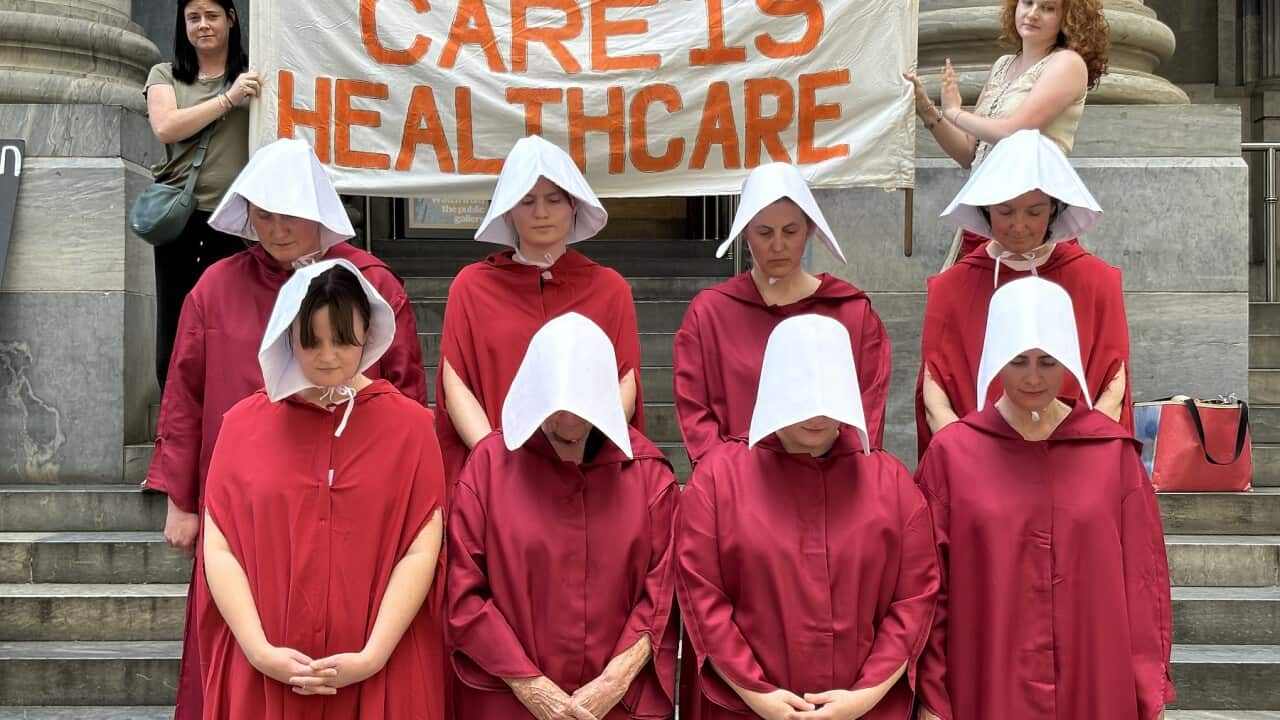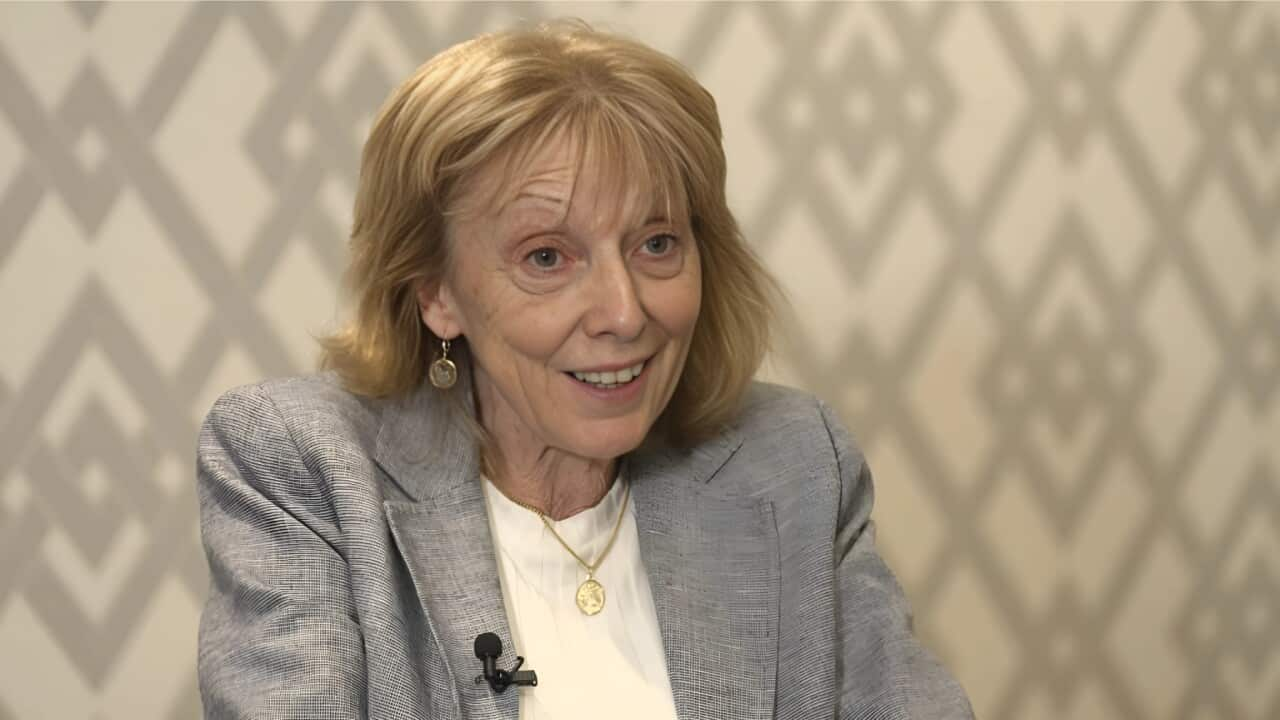TRANSCRIPT
As the United States election draws closer, abortion access and reproductive rights are again stoking conversation across the political spectrum.
Nearly half of all US states have introduced near-total or partial abortion bans in the last two years, and the outcome of the November poll could see more follow suit — depending on who wins.
Democratic candidate and current vice president Kamala Harris is pro-choice, while Republican candidate and former president Donald Trump is anti-abortion.
The recent changes to abortion access came into effect during Trump’s presidency when in 2022, the Supreme Court overturned the landmark 1973 Roe v Wade case, ending nearly 50 years of constitutional abortion access and instead giving each state the right to regulate reproductive laws and restrictions.
The winding back of these once-seemingly unassailable rights in the US has left many women around the world reeling, including in Australia.
The question many want to know is: Could the same thing happen here?
"Queensland is such a wild card at the moment, that if it was going to happen in any place, Queensland is the place where there's the greatest potential for either a revisiting of the abortion decriminalisation or a radical conservative agenda coming into play."
That's Dr Prudence Flowers - a Senior Lecturer in US History at Flinders University in South Australia.
During the Queensland state election campaign, the prospect of abortion rights being reduced emerged as an election issue.
In October, conservative MP Robbie Katter from the Katter Australia Party flagged changes that would result in restrictions to abortion access.
In recent days, federal Coalition senator Jacinta Nampijinpa Price has described late-term abortion as being akin to "infanticide" - urging other members of the opposition not to shy away from the issue.
Nationals Senator Bridget Mckenzie has called abortion a 'moral dilemma' but she and opposition finance spokeswoman Jane Hume have both distanced themselves from Nampijinpa Price's comments - rejecting suggestions that the Coalition would change abortion laws.
The Senator says she does not believe it will even be an issue in the next federal election.
"This is absolutely in the purvey of states and territory governments and lawmakers. That is how it is in our Commonwealth. So it's not unsurprising that it's become a feature in a state election. I don't think it will be an issue in the upcoming federal election, because these are matters for state and territory governments."
So what exactly is the legal status of abortions in Australia?
Abortion has been decriminalised across Australia, but each jurisdiction has different restrictions and in theory it could be re-criminalised if anti-abortion state governments are elected.
There is no right to abortion enshrined in the Australian constitution and no overarching national law.
Western Australia was the last jurisdiction in Australia to decriminalise abortion, with new laws coming into effect in 2024 meaning abortions there are now legal up to 23 weeks of pregnancy.
South Australia decriminalised abortion in 2021 and pregnancy termination is now legal up to 22 weeks and six days but an abortion can be performed later in the pregnancy if two medical practitioners agree it is appropriate.
Similarly, in Victoria and the Northern Territory, abortion can be accessed up to a gestational limit of 24 weeks and beyond that time frame, abortion can be provided if two medical practitioners agree.
In New South Wales, an abortion can be performed up to 22 weeks gestation and after that, two doctors need to approve the procedure abortion which must then take place in a hospital or approved medical facility.
The ACT allows abortions at any stage of gestation and medical abortions are free for ACT residents up to nine weeks of pregnancy, while surgical abortions are free up to 16 weeks.
In Tasmania, abortions can be performed up to 16 weeks of pregnancy and they can also take place between 16 and 20 weeks if two doctors agree, while after 20 weeks they can only performed if deemed medically necessary.
Professor Louise Keogh, a health sociologist at the University of Melbourne School of Population and Global Health, tells SBS News that while abortion has been decriminalised, this does not mean it is easy to access.
"In terms of access in Australia, we have a heavy reliance on private services, which is probably not ideal, but we would probably like to see a slightly higher proportion of public services. It's very difficult to get cheap or free abortion in most states. In Australia, most people, most women would be reliant on a Marie Stopes kind of service, which has an out-of-pocket fee.In Australia, we have a heavy reliance on private services, which is not ideal. It’s very difficult to get cheap or free abortion in most states."
The cost of an abortion varies depending on the type of procedure, provider and location.
In some cases, they can be free, but in others, they can cost thousands of dollars and many people also need to pay for additional medication, follow-up treatment and travel costs if they live in areas with limited services.
It's very difficult to get cheap or free abortion in most states.
Kirsten Black, a professor of sexual and reproductive health at the University of Sydney, says reproductive care remains difficult in many parts of the country.
She explains that women in small towns also face challenges when trying to find a doctor who will agree to perform or prescribe an abortion.
"They do face lots of barriers in terms of not having a supportive healthcare practitioner. If the GP in their town is a conscientious objector and won't provide medical abortion, they may need to either go, they can do telehealth or they may need to travel large distances. And sometimes the pharmacists also will refuse to provide the pills that are prescribed. So I think that the other thing is that we need to look at our conscientious objection rules and ensure that there is that healthcare practitioners who don't want to provide abortion, they must refer to another practitioner so that the person has access."
Could abortion rights ever be reversed in Australia?
Queensland is not the only jurisdiction where the possibility of reversing or tightening abortion laws has been discussed.
In September, South Australian Liberal MP Ben Hood introduced a bill to force people who want to terminate their pregnancy after 28 weeks to deliver their baby alive.
The mother would then have the choice to keep the child or have them adopted.
State parliament voted on the bill on 16 October and it was narrowly defeated, with nine in favour and ten against.
In the Northern Territory, Chief Minister Lia Finocchiaro — who was elected in August — has previously said she has no plans to change abortion laws, but would consider supporting similar legislation.
Professor Kirsten Black says 99 per cent of abortions take place in the first or early second trimester.
"Abortions after 20 weeks really only take place in very extreme circumstances or often where there's fetal or severe medical illness. And often the process there is that feticide takes place before the abortion because otherwise it's very distressing anyway. So they're kind of nonsensical bills really, and there are very few cases presenting those circumstances where there's not a really good kind of medical reason."
Dr Flowers says she doesn't rule out a conscience vote on the issue in different jurisdictions.
This is significant because in the decades before Roe v Wade was overturned, the anti-abortion movement in the US was focused on trying to ban or regulate abortions after 20 weeks of pregnancy.
Australia has never had federal protection for abortion, and regulations have always been state-based, in the same way the US now operates.
Dr Prudence Flowers believes total or near-total bans — similar to those being introduced in parts of the US — are unlikely in Australia.
"Because there has been such a recent wave of decriminalisation occurring over the last decade, it's very hard to imagine total bans being introduced. I think in terms of the Australian context, the threat to abortion rights is more nuanced but still very real and it's something that people should pay a lot of attention to."
Has the federal government made any changes to abortion access?
From a federal perspective, changes to abortion laws in Australia would be complex.
One option would be through constitutional change, but this is a lengthy and expensive process.
Changing the Australian constitution to enshrine protection – or restrictions – for abortion rights would require a bill to be created and passed through parliament, followed by a national referendum.
To pass, it would need to be supported by 51 per cent of the population and four out of the six states.
Only eight of Australia's 44 referendums were a Yes.
Constitutional law scholar and associate professor at the University of Queensland, Rebecca Ananian-Welsh, says while this is theoretically possible, it is not likely.
"There's another option which happens and that's where the states give their power up or refer their power up to the Commonwealth government. So the states will get together and say, we agree that the Commonwealth can legislate on this even though it doesn't usually do it."
But Ananian-Welsh she says this is typically used for issues such as terrorism, which is not listed as a constitutional power, but was considered a national matter.
She says most likely if there were any changes to abortion at a national level, they would be through what might be called cooperative federalism, which is where the states, territories and Commonwealth agree on some sort of cooperative approach.
"It’s the easiest one legally speaking and constitutionally speaking … but politically speaking you are talking about getting different governments to agree with each other."
While neither the federal government nor the Opposition have indicated plans to change abortion access nationally, there are calls for existing protections and services to be improved.
Professor Keogh says she believes the government could play a larger role in improving abortion services through public systems.
"I would really like to see public hospitals, public maternity hospitals in major cities playing the role that they should be playing in abortion provision. I think there's potential for the federal government to put pressure on that and coordinate the states better in terms of providing the services that the community needs."
In a statement to SBS News, federal Health Minister Mark Butler said the government has removed several restrictions for providing and prescribing the medical abortion medication MS-2 Step, reducing barriers for both medical professionals and people seeking abortions.
The statement also said that the government was committed to ensuring that all Australian women have equitable access to the healthcare they need, particularly women in rural and regional areas and those experiencing disadvantage.













